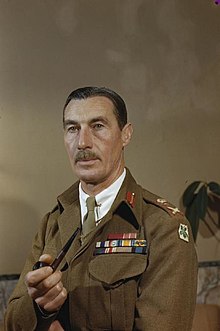Ronald Scobie
Sir Ronald MacKenzie Scobie KBE , CB , DSO , MC (born June 8, 1893 in Mandalay , British Burma , † February 23, 1969 in Odiham , Hampshire ) was a British Army officer, most recently Lieutenant-General , best known for his role in the defense of Tobruk during World War II and as Commander-in-Chief of British Forces in Greece from 1944 to 1946.
Life
Scobie was educated at Cheltenham College and the Royal Military Academy Woolwich . In 1914 he played three times for the Scottish national rugby team . During World War I he served with the Royal Engineers on the Western Front , most recently as a brigade major . From 1920 to 1924 he was an officer in the Company of Gentlemen Cadets in Woolwich. He completed the course at Staff College Camberley and later at Imperial Defense College . From 1927 to 1931 he served in the Aldershot Command , most recently as Brigade Major of the 5th Infantry Brigade. From 1932 to 1935 he stayed in Australia , where he worked at the Royal Military College of Australia .
From January 1938 Scobie served as Assistant Adjutant-General in the London War Office . At the outbreak of World War II, he was appointed Deputy Director of Mobilization . In May 1940 he was transferred to the Middle East, where he was Deputy Adjutant-General at the Middle East Command . In August of the same year he became Brigadier General Staff with the British forces in Sudan , which he remained until mid-October 1941. He then received command of the 70th Infantry Division , which was transported to Tobruk by the Royal Navy at that time to replace the previous Australian garrison. He was also appointed commander of the fortress, which had been besieged by German-Italian troops ( Panzergruppe Afrika ) since April 1941 . In early December 1941, the forces of the Axis powers withdrew from the attacks of the Eighth Army under Neil Ritchie in the course of Operation Crusader and the garrison finally received relief , which was also favored by attempts to break out by Scobie's troops.
In February 1942, after his division had been withdrawn to Syria, Scobie returned to his old post as Deputy Adjutant-General with the Middle East Command. In August 1942 he became General Officer Commanding the troops stationed in Malta . From March 1943 he served as Chief of the General Staff of the Middle East Command under Henry Wilson and his successor Bernard Paget .
In September 1944 by the Greek resistance groups was EDES and ELAS and the British in the headquarters of the Allied Force Headquarters , the agreement of Caserta made, which provided the crew of Greece by British troops and the British acknowledged the command of all Greek guerrilla groups. Scobie was appointed by his government to command the occupation troops that landed in the Peloponnese shortly afterwards and reached Athens in October 1944 . In December 1944 there was a trial of strength of the rival groups of the later Greek Civil War in the Battle of Athens , in which the British supported the troops of the returned government against the pro-communist EAM-ELAS. An armistice did not enter into force until midnight on January 15th. In the Varkiza Agreement of February 1945, EAM-ELAS had to agree to their disarmament.
Scobie stayed in Greece until 1946, the year civil war openly broke out. He retired from active service the following year with the honorary rank of Lieutenant-General. In retirement he was Lieutenant of the Tower of London (1951-1954) and Colonel Commandant of the Royal Engineers (1951-1958).
literature
- Henry Maule: Scobie, Hero of Greece: The British Campaign, 1944-5. Arthur Barker, 1975.
- Christopher M. Woodhouse: The Struggle for Greece, 1941-1949. C. Hurst & Co., 2002.
Web links
- Private Papers of Lieutenant General Sir Ronald Scobie KBE CB DSO at the Imperial War Museum
- Ronald MacKenzie Scobie at unithistories.com
Individual evidence
- ↑ player profile at espn.co.uk
| personal data | |
|---|---|
| SURNAME | Scobie, Ronald |
| ALTERNATIVE NAMES | Scobie, Sir Ronald MacKenzie (full name) |
| BRIEF DESCRIPTION | British Lieutenant General in World War II |
| DATE OF BIRTH | June 8, 1893 |
| PLACE OF BIRTH | Mandalay , British Burma |
| DATE OF DEATH | February 23, 1969 |
| Place of death | Odiham , Hampshire |
